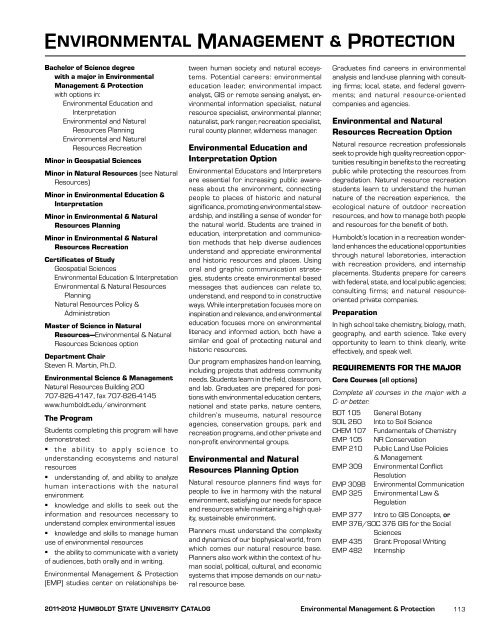2011-12 Academic Year - Bad Request - Humboldt State University
2011-12 Academic Year - Bad Request - Humboldt State University
2011-12 Academic Year - Bad Request - Humboldt State University
You also want an ePaper? Increase the reach of your titles
YUMPU automatically turns print PDFs into web optimized ePapers that Google loves.
Environmental Management & Protection<br />
Bachelor of Science degree<br />
with a major in Environmental<br />
Management & Protection<br />
with options in:<br />
Environmental Education and<br />
Interpretation<br />
Environmental and Natural<br />
Resources Planning<br />
Environmental and Natural<br />
Resources Recreation<br />
Minor in Geospatial Sciences<br />
Minor in Natural Resources (see Natural<br />
Resources)<br />
Minor in Environmental Education &<br />
Interpretation<br />
Minor in Environmental & Natural<br />
Resources Planning<br />
Minor in Environmental & Natural<br />
Resources Recreation<br />
Certificates of Study<br />
Geospatial Sciences<br />
Environmental Education & Interpretation<br />
Environmental & Natural Resources<br />
Planning<br />
Natural Resources Policy &<br />
Administration<br />
Master of Science in Natural<br />
Resources—Environmental & Natural<br />
Resources Sciences option<br />
Department Chair<br />
Steven R. Martin, Ph.D.<br />
Environmental Science & Management<br />
Natural Resources Building 200<br />
707-826-4147, fax 707-826-4145<br />
www.humboldt.edu/environment<br />
The Program<br />
Students completing this program will have<br />
demonstrated:<br />
the ability to apply science to<br />
understanding ecosystems and natural<br />
resources<br />
understanding of, and ability to analyze<br />
human interactions with the natural<br />
environment<br />
knowledge and skills to seek out the<br />
information and resources necessary to<br />
understand complex environmental issues<br />
knowledge and skills to manage human<br />
use of environmental resources<br />
the ability to communicate with a variety<br />
of audiences, both orally and in writing.<br />
Environmental Management & Protection<br />
(EMP) studies center on relationships be-<br />
<strong>2011</strong>-20<strong>12</strong> <strong>Humboldt</strong> <strong>State</strong> <strong>University</strong> Catalog<br />
tween human society and natural ecosystems.<br />
Potential careers: environmental<br />
education leader, environmental impact<br />
analyst, GIS or remote sensing analyst, environmental<br />
information specialist, natural<br />
resource specialist, environmental planner,<br />
naturalist, park ranger, recreation specialist,<br />
rural county planner, wilderness manager.<br />
Environmental Education and<br />
Interpretation Option<br />
Environmental Educators and Interpreters<br />
are essential for increasing public awareness<br />
about the environment, connecting<br />
people to places of historic and natural<br />
significance, promoting environmental stewardship,<br />
and instilling a sense of wonder for<br />
the natural world. Students are trained in<br />
education, interpretation and communication<br />
methods that help diverse audiences<br />
understand and appreciate environmental<br />
and historic resources and places. Using<br />
oral and graphic communication strategies,<br />
students create environmental based<br />
messages that audiences can relate to,<br />
understand, and respond to in constructive<br />
ways. While interpretation focuses more on<br />
inspiration and relevance, and environmental<br />
education focuses more on environmental<br />
literacy and informed action, both have a<br />
similar end goal of protecting natural and<br />
historic resources.<br />
Our program emphasizes hand-on learning,<br />
including projects that address community<br />
needs. Students learn in the field, classroom,<br />
and lab. Graduates are prepared for positions<br />
with environmental education centers,<br />
national and state parks, nature centers,<br />
children’s museums, natural resource<br />
agencies, conservation groups, park and<br />
recreation programs, and other private and<br />
non-profit environmental groups.<br />
Environmental and Natural<br />
Resources Planning Option<br />
Natural resource planners find ways for<br />
people to live in harmony with the natural<br />
environment, satisfying our needs for space<br />
and resources while maintaining a high quality,<br />
sustainable environment.<br />
Planners must understand the complexity<br />
and dynamics of our biophysical world, from<br />
which comes our natural resource base.<br />
Planners also work within the context of human<br />
social, political, cultural, and economic<br />
systems that impose demands on our natural<br />
resource base.<br />
Graduates find careers in environmental<br />
analysis and land-use planning with consulting<br />
firms; local, state, and federal governments;<br />
and natural resource-oriented<br />
companies and agencies.<br />
Environmental and Natural<br />
Resources Recreation Option<br />
Natural resource recreation professionals<br />
seek to provide high quality recreation opportunities<br />
resulting in benefits to the recreating<br />
public while protecting the resources from<br />
degradation. Natural resource recreation<br />
students learn to understand the human<br />
nature of the recreation experience, the<br />
ecological nature of outdoor recreation<br />
resources, and how to manage both people<br />
and resources for the benefit of both.<br />
<strong>Humboldt</strong>’s location in a recreation wonderland<br />
enhances the educational opportunities<br />
through natural labor atories, interaction<br />
with recreation providers, and internship<br />
placements. Students prepare for careers<br />
with federal, state, and local public agencies;<br />
consulting firms; and natural resourceoriented<br />
private companies.<br />
Preparation<br />
In high school take chemistry, biology, math,<br />
geography, and earth science. Take every<br />
opportunity to learn to think clearly, write<br />
effectively, and speak well.<br />
REQUIREMENTS FOR THE MAJOR<br />
Core Courses (all options)<br />
Complete all courses in the major with a<br />
C- or better.<br />
BOT 105 General Botany<br />
SOIL 260 Into to Soil Science<br />
CHEM 107 Fundamentals of Chemistry<br />
EMP 105 NR Conservation<br />
EMP 210 Public Land Use Policies<br />
& Management<br />
EMP 309 Environmental Conflict<br />
Resolution<br />
EMP 309B Environmental Communication<br />
EMP 325 Environmental Law &<br />
Regulation<br />
EMP 377 Intro to GIS Concepts, or<br />
EMP 376/SOC 376 GIS for the Social<br />
Sciences<br />
EMP 435 Grant Proposal Writing<br />
EMP 482 Internship<br />
Environmental Management & Protection<br />
113

















